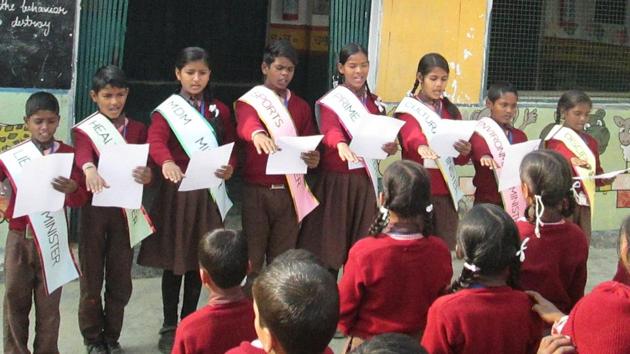Most UP schools yet to start Bal Sansad to develop life skills in kids
The Sarva Siksha Abhiyaan Uttar Pradesh aimed at forming child cabinets in schools to ensure active participation of students in making schools better. So far child cabinets have been formed in 10581 primary schools of 10 districts
Bal Sansad, a parliament of children in primary schools of Uttar Pradesh is still in its nascent stage in most schools. According to an estimate child cabinets have been formed in only 10,581 primary schools of 10 districts to help students develop skills in leadership, participation, democratic process and decision making .

The Sarva Siksha Abhiyaan Uttar Pradesh aimed at forming child cabinets in schools to ensure active participation of students in making schools better. In 2015-16, child cabinets were strengthened in 10 districts under Beti Bachao Beti Padhao campaign and detailed guidelines were sent to the districts on July 22, 2015 but there were few takers.
“Instructions were issued to school principals to develop Bal Sansad in all primary schools. Due to some reasons it could not be pursued. So far child cabinets have been formed in 10581 primary schools of 10 districts,” said an official in Sarva Shiksha Abhiyaan (SSA), requesting anonymity.
Bal Sansad is a forum at which students express their views on various subjects, including their school, family, neighbours, society and can also talk about their rights freely.
Bal Sansad envisages developing leadership quality among students at the primary school level. The school prefects and other office-bearers were to be elected through secret ballot with students taking part in the electoral process, a teacher said.
At a primary school in Tilauli, Gorakhpur where Bal Sansad is regular , Alpa Nigam, headmistress said it made children more ‘responsible and disciplined’. They had a sense of ownership and developed leadership qualities at an early age, she said.
According to Alpa Nigam, duly elected Bal Sansad shares the responsibility with teachers in maintaining discipline in the school. “As many government primary schools do not have sufficient number of teachers, the Bal Sansad helps maintain classroom discipline,” she said.
By and large, majority of the UP primary schools have not introduced Bal Sansad. Instead, they followed the old practice of Meena Manch where teachers identify bright and talented students and entrust them with certain responsibilities like spreading awareness among people about literacy, cleanliness, and water conservation.
Objectives
Active participation of students in the progress of the school
Development of leadership quality and decision making
To help maintain academic atmosphere in the school
To develop child friendly school
Role and responsibilities of PM and deputy PM
To convene a meeting of ministers at every 15/30 days,to take stock of the work done and to lay down future plans
To convene general body meeting of all studentsevery 3 months
To review the work done by all the ministers
To check the nails, hair of students, cleanliness of toilets and availability of water
To carry out tree plantation in school
Utility
Bal Sansand helps in overall personality development of the students
It plays important role in improving the skills of students
How to form Bal Sansad
The students form the general body which elects one among them as prime minister and another as deputy prime minister. The rider is one of them has to be a girl in case of co-educational school.
The other ministers are: education minister, deputy education minister, health minister, agriculture minister, library and science minister, cultural and sports minister
- A group of children at primary school level
- A platform for children to make them participate in managing and developing school, to develop life skills such as decision making, communication and to help in holistic development of child.
- To maintain safe, healthy and child friendly school.
General body meeting will be held. Teacher will brief about cabinet. Children will elect one prime minister and one deputy prime minister (one girl)












